This week we are reading through the Parable of the Pounds found in Luke 19:11-27 and the Parable of the Wicked Tenants found in Luke 20:9-18. These parables bookend Jesus’ entry into Jerusalem (Palm Sunday) and his cleansing of the temple. If you have time, please read the context in which these parables are told as set forth in Luke 19-20. Attached are the commentaries of Bailey and ++Dmitri (Dmitri doesn’t address the later parable), and I commit them to you.
The parable of the Pounds concerns the unrealized or future eschatology (the kingdom is not here yet) and how followers of Christ are to conduct themselves in the interim. This parable is told immediately before Jesus enters Jerusalem where most of his followers expected him to immediately seize political control. Unlike the other parable, the Parable of the Pounds is told with reference to an actual historical event. As related in both Baily and ++Dmitri, Herod the Great’s son, Archelaus, made a journey to Rome to persuade Caesar Augustus to make him King of Judea. At the same time, citizens of Judea sent an alternative delegation to Augustus to argue against the appointment. As related in the parable, the nobleman (like Archelaus) is absent but leaves his supporters with the means (10 pounds) to continue to do business in his name while he is absent. When the nobleman returns as king, his supporters are judged on their faithfulness by their continued outward support and working on behalf of the nobleman during his absence. It takes courage and faithfulness to be an outspoken loyal supporter of a ruler when a coup is in the making. And so like the good servants in the parable, we are not to be idle until Christ returns but are to be actively working on his behalf.
The Parable of the Wicked Tenants occurs after Jesus’s cleansing of the temple. This parable generally follows, and is probably based upon, the Song of the Vineyard in Isaiah 5:1-6. In the parable, the tenants assault the servants of the landlord, who then sends his son to the tenants to call them back to him. The tenants kill the son, and the landlord then promises to destroy the tenants and to give the land to others. As Bailey has pointed out before, much of Jesus’s teachings are directed against the oppressive temple and religious authorities who are the tenants in this parable. As you read through this parable, ask yourself what this parable says about who Jesus is – as both a servant and a son of the landlord. Also, both of the parables end with a pronouncement of judgment, but as Bailey points out, there remains the question as to whether the judgment is actually carried out. And so also think about what the open-endedness of the conclusions of the parables speaks as to who God is.
Dinner is at 6. Discussion around 6:45. Hope to see you here.
Open for me the gates of righteousness; *
Psalm 118:19-27
I will enter them;
I will offer thanks to the Lord.
“This is the gate of the Lord; *
he who is righteous may enter.”
I will give thanks to you, for you answered me *
and have become my salvation.
The same stone which the builders rejected *
has become the chief cornerstone.
This is the Lord’s doing, *
and it is marvelous in our eyes.
On this day the Lord has acted; *
we will rejoice and be glad in it.
Hosannah, Lord, hosannah! *
Lord, send us now success.
Blessed is he who comes in the name of the Lord; *
we bless you from the house of the Lord.
God is the Lord; he has shined upon us; *
form a procession with branches up to the horns of the altar.

